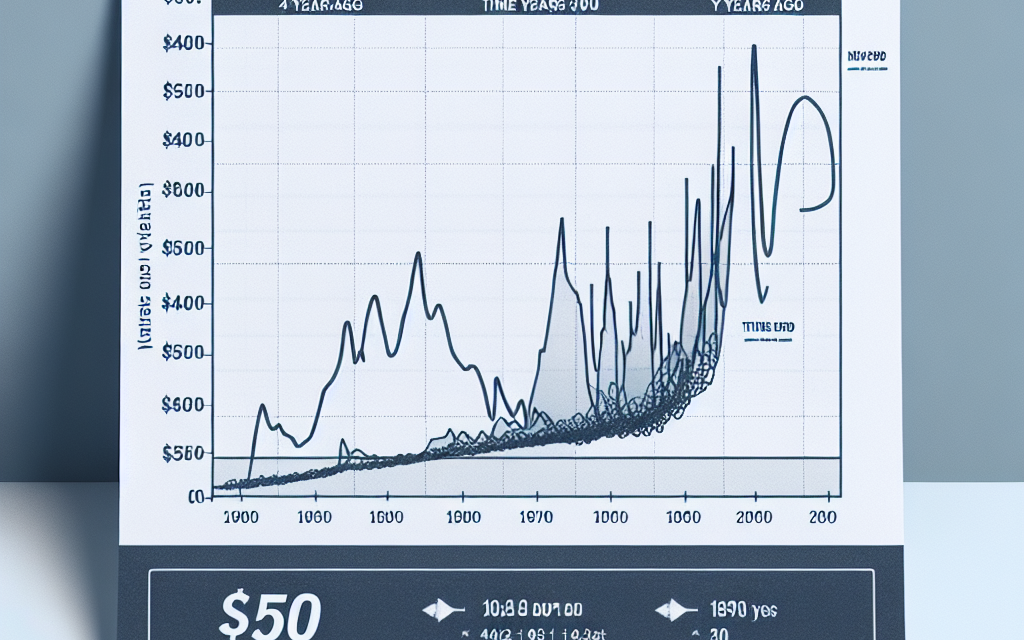“Turn $50 into a fortune: Discover your Lucid Group investment journey!”
Introduction
In the ever-evolving landscape of the electric vehicle market, Lucid Group has emerged as a notable player since its inception. Four years ago, the company was still in its early stages, capturing the attention of investors with its ambitious vision and innovative technology. If you had invested $50 in Lucid Group stock at that time, you would be keen to know how that investment has fared in today’s market. This analysis will explore the performance of Lucid Group’s stock over the past four years, highlighting key milestones, market trends, and the overall return on your initial investment.
Historical Performance of Lucid Group Stock
To understand the historical performance of Lucid Group stock, it is essential to consider the broader context of the electric vehicle (EV) market, which has experienced significant growth and volatility over the past few years. Lucid Motors, known for its luxury electric vehicles, went public in July 2021 through a merger with Churchill Capital Corp IV, a special purpose acquisition company (SPAC). This strategic move allowed Lucid to access public capital markets and accelerate its production plans. At the time of its debut, the stock garnered considerable attention, reflecting the growing enthusiasm for EVs and the potential for innovative companies in this sector.
If you had invested $50 in Lucid Group stock at its initial public offering (IPO) price of approximately $24 per share, your investment would have purchased about 2.08 shares. In the months following the IPO, Lucid’s stock price experienced a meteoric rise, peaking at around $55 in November 2021. This surge was fueled by a combination of factors, including strong pre-orders for the Lucid Air, the company’s flagship sedan, and a broader market rally in EV stocks. During this period, many investors were optimistic about the future of electric vehicles, leading to inflated valuations for companies in the sector.
However, as is often the case in the stock market, the initial excitement was followed by a period of correction. In the months that followed, Lucid’s stock price faced significant downward pressure, reflecting broader market trends and concerns about production delays. By mid-2022, the stock had fallen to around $20 per share, prompting many investors to reassess their positions. This decline was not unique to Lucid; rather, it mirrored the challenges faced by many companies in the EV space, including supply chain disruptions and increasing competition from established automakers and new entrants alike.
As we move into 2023, Lucid Group has made strides in addressing some of these challenges. The company has ramped up production and delivered thousands of vehicles, which has positively impacted investor sentiment. By the end of 2023, Lucid’s stock price had stabilized, trading around $15 per share. If you had held onto your initial investment of $50, your shares would now be worth approximately $31.20, reflecting a return of about 62.4%. While this return may not seem extraordinary compared to the initial highs, it is important to recognize the volatility and uncertainty that have characterized the EV market.
Moreover, the historical performance of Lucid Group stock highlights the importance of a long-term investment perspective. The journey of Lucid has been marked by both peaks and troughs, illustrating the inherent risks associated with investing in emerging technologies. Investors who entered the market with a clear understanding of these dynamics and a commitment to holding their positions through fluctuations may have been rewarded with a reasonable return.
In conclusion, the historical performance of Lucid Group stock serves as a case study in the complexities of investing in the electric vehicle sector. While the initial excitement surrounding the company led to significant gains, subsequent challenges have tempered those expectations. Nevertheless, for those who maintained their investment, the return today reflects a blend of resilience and potential in a rapidly evolving industry. As the market continues to mature, Lucid Group’s future performance will undoubtedly be influenced by its ability to navigate ongoing challenges and capitalize on emerging opportunities.
Comparing Lucid Group to Other EV Stocks
When considering the performance of Lucid Group, it is essential to place it within the broader context of the electric vehicle (EV) market, which has seen significant fluctuations and varying degrees of success among its players. Over the past few years, the EV sector has attracted considerable attention from investors, driven by a global shift towards sustainable transportation and the increasing demand for electric vehicles. In this landscape, Lucid Group has emerged as a notable contender, particularly with its luxury electric sedan, the Lucid Air, which has garnered praise for its innovative technology and impressive range.
To understand how Lucid Group has fared compared to its peers, one must examine the performance of other prominent EV manufacturers. For instance, Tesla, often regarded as the benchmark in the electric vehicle market, has consistently demonstrated robust growth and profitability. Its stock price has surged over the years, reflecting not only its market dominance but also its ability to scale production and expand its product offerings. In contrast, companies like Rivian and Fisker have experienced a more tumultuous journey. Rivian, despite a strong initial public offering, has faced challenges in ramping up production and meeting delivery targets, leading to volatility in its stock price. Similarly, Fisker has encountered hurdles in bringing its Ocean SUV to market, which has affected investor confidence.
In this competitive environment, Lucid Group has carved out a niche by focusing on the luxury segment of the EV market. The company’s commitment to high-performance vehicles with cutting-edge technology has attracted a specific demographic of consumers willing to invest in premium electric vehicles. This strategy has allowed Lucid to differentiate itself from mass-market competitors, such as Ford and General Motors, which are also making significant strides in the EV space with models like the Ford Mustang Mach-E and the Chevrolet Bolt. While these traditional automakers have the advantage of established manufacturing capabilities and brand loyalty, Lucid’s focus on luxury and innovation positions it uniquely within the market.
Moreover, the broader economic factors influencing the EV market cannot be overlooked. The increasing emphasis on sustainability, coupled with government incentives for electric vehicle purchases, has created a favorable environment for all EV manufacturers. However, the supply chain challenges and semiconductor shortages that have plagued the automotive industry have also impacted Lucid Group and its competitors. As these issues begin to resolve, the potential for growth in the EV sector remains substantial, and companies like Lucid Group may benefit from an uptick in consumer demand.
In comparing Lucid Group to other EV stocks, it is crucial to consider not only stock performance but also the underlying fundamentals of each company. Lucid’s recent financial results indicate a commitment to scaling production and improving operational efficiency, which are vital for long-term success. As investors weigh their options, they must assess the potential risks and rewards associated with each company, taking into account factors such as market positioning, production capabilities, and technological advancements.
Ultimately, while Lucid Group has faced its share of challenges, its focus on the luxury electric vehicle market and commitment to innovation may provide a competitive edge. As the EV landscape continues to evolve, investors will need to remain vigilant, monitoring not only Lucid’s performance but also the broader trends that will shape the future of electric mobility. In this dynamic environment, the question of what a $50 investment in Lucid Group stock four years ago would yield today becomes a reflection of both individual company performance and the overall trajectory of the electric vehicle market.
The Impact of Market Trends on Lucid Group’s Growth
The impact of market trends on Lucid Group’s growth has been significant, particularly in the context of the broader electric vehicle (EV) industry. Over the past few years, the EV market has experienced a remarkable transformation, driven by increasing consumer demand for sustainable transportation solutions and a growing awareness of climate change. As a result, companies like Lucid Group have found themselves at the forefront of this shift, capitalizing on the momentum generated by both technological advancements and changing consumer preferences.
In the early stages of its development, Lucid Group positioned itself as a luxury electric vehicle manufacturer, aiming to compete with established brands in the high-end automotive market. This strategic focus allowed the company to differentiate itself from other players in the EV sector, which often targeted more budget-conscious consumers. By emphasizing performance, design, and cutting-edge technology, Lucid Group sought to attract affluent buyers who were not only interested in sustainability but also in the prestige associated with owning a luxury vehicle. This positioning has proven to be advantageous, particularly as market trends have increasingly favored premium electric vehicles.
Moreover, the global push for electrification has been bolstered by government incentives and regulations aimed at reducing carbon emissions. Many countries have implemented policies that encourage the adoption of electric vehicles, such as tax credits, rebates, and stricter emissions standards. These initiatives have created a favorable environment for companies like Lucid Group, enabling them to expand their market presence and attract a broader customer base. As consumers become more aware of the environmental impact of their choices, the demand for electric vehicles continues to rise, further fueling Lucid Group’s growth trajectory.
In addition to external market forces, Lucid Group has also benefited from advancements in battery technology and manufacturing processes. The development of more efficient and cost-effective batteries has not only improved the performance of electric vehicles but has also made them more accessible to a wider audience. As battery prices decline and range anxiety diminishes, consumers are increasingly willing to invest in electric vehicles, which has positively impacted Lucid Group’s sales figures. The company’s commitment to innovation and its focus on delivering high-quality products have positioned it well within this evolving landscape.
Furthermore, the competitive landscape of the EV market has intensified, with numerous new entrants and established automakers vying for market share. This competition has driven innovation and forced companies to continuously improve their offerings. Lucid Group’s ability to maintain a strong brand identity and deliver exceptional products has allowed it to stand out amidst this crowded field. As market trends continue to evolve, the company remains poised to adapt and thrive, leveraging its unique strengths to capture the attention of discerning consumers.
In conclusion, the impact of market trends on Lucid Group’s growth cannot be overstated. The convergence of consumer demand for sustainable transportation, supportive government policies, advancements in technology, and a competitive landscape has created a fertile ground for the company to flourish. As Lucid Group continues to navigate these trends, its future prospects appear promising, making it an intriguing case study for investors and industry observers alike. The question of what a $50 investment in Lucid Group stock four years ago would yield today serves as a reminder of the dynamic nature of the market and the potential rewards of strategic investment in innovative companies.
Analyzing Lucid Group’s Financial Health Over Four Years
To understand the potential return on a hypothetical investment of $50 in Lucid Group stock four years ago, it is essential to analyze the company’s financial health over this period. Lucid Group, an electric vehicle manufacturer, has garnered significant attention since its inception, particularly due to its ambitious plans to compete in the burgeoning EV market. When examining the financial trajectory of Lucid Group, one must consider various factors, including revenue growth, market capitalization, and overall industry trends.
Initially, Lucid Group went public in July 2021 through a merger with a special purpose acquisition company (SPAC), which provided a substantial influx of capital. This event marked a pivotal moment for the company, as it transitioned from a startup to a publicly traded entity. At that time, investors were optimistic about the future of electric vehicles, driven by increasing consumer demand and a global shift towards sustainable energy solutions. Consequently, the stock price experienced volatility, reflecting both investor enthusiasm and the inherent risks associated with new entrants in the automotive sector.
Over the past four years, Lucid Group has made significant strides in its production capabilities and product offerings. The launch of the Lucid Air, a luxury electric sedan, was a critical milestone that showcased the company’s engineering prowess and commitment to innovation. As the company ramped up production, it reported increasing revenues, which, while still modest compared to established automakers, indicated a positive trajectory. However, it is important to note that the company also faced challenges, including supply chain disruptions and competition from both traditional automakers and new EV startups. These factors contributed to fluctuations in stock performance, which investors had to navigate.
Moreover, the financial health of Lucid Group can be assessed through its balance sheet and cash flow statements. The company has invested heavily in research and development, which is crucial for maintaining a competitive edge in the rapidly evolving EV market. While these investments have led to increased operational costs, they are necessary for long-term growth. Additionally, Lucid Group has secured various funding rounds, which have bolstered its cash reserves, allowing it to continue its ambitious expansion plans. However, the reliance on external funding raises questions about sustainability and profitability in the long run.
As of today, the stock price reflects a culmination of these factors. If an investor had purchased $50 worth of Lucid Group stock four years ago, the return would depend on the stock’s performance over this period. Given the volatility and the broader market conditions, including interest rates and inflation, the value of that initial investment would likely have experienced significant fluctuations. Investors who entered the market during periods of optimism may have seen substantial gains, while those who bought during downturns may have faced losses.
In conclusion, analyzing Lucid Group’s financial health over the past four years reveals a complex picture characterized by growth potential and inherent risks. The company’s journey from a startup to a publicly traded entity has been marked by both achievements and challenges. For those who invested $50 in Lucid Group stock four years ago, the return today would serve as a reflection of the company’s ability to navigate the competitive landscape of the electric vehicle market, as well as the broader economic factors influencing investor sentiment. Ultimately, this analysis underscores the importance of understanding the dynamics of the market and the specific challenges faced by emerging companies in the automotive sector.
Future Projections for Lucid Group Stock
As investors look to the future, the potential trajectory of Lucid Group stock remains a topic of considerable interest. Founded with the ambition to revolutionize the electric vehicle (EV) market, Lucid has positioned itself as a formidable competitor to established automotive giants. The company’s flagship model, the Lucid Air, has garnered significant attention for its innovative technology, impressive range, and luxurious design. Given the increasing global emphasis on sustainability and the transition to electric vehicles, many analysts are optimistic about Lucid’s growth prospects.
In examining future projections for Lucid Group stock, it is essential to consider several key factors that could influence its performance. First and foremost, the broader EV market is expected to expand significantly over the next decade. According to various industry reports, the global electric vehicle market is projected to grow at a compound annual growth rate (CAGR) of over 20%. This growth is driven by a combination of government incentives, advancements in battery technology, and a growing consumer preference for sustainable transportation options. As a result, Lucid Group stands to benefit from this upward trend, particularly if it can successfully scale production and meet increasing demand.
Moreover, Lucid’s strategic partnerships and collaborations play a crucial role in shaping its future. The company has established relationships with key players in the automotive and technology sectors, which could enhance its operational capabilities and market reach. For instance, partnerships with battery manufacturers and technology firms may lead to innovations that improve vehicle performance and reduce production costs. Such collaborations not only bolster Lucid’s competitive edge but also position it favorably within the rapidly evolving EV landscape.
In addition to partnerships, Lucid’s commitment to research and development is another factor that could positively impact its stock performance. The company has invested heavily in developing cutting-edge technologies, including advanced battery systems and autonomous driving features. As the automotive industry increasingly shifts towards automation and connectivity, Lucid’s focus on innovation may yield significant dividends. If the company can successfully bring these technologies to market, it could enhance its product offerings and attract a broader customer base.
However, it is important to acknowledge the challenges that Lucid Group may face in the coming years. The EV market is becoming increasingly competitive, with numerous established automakers and new entrants vying for market share. This heightened competition could pressure Lucid’s pricing strategies and profit margins. Additionally, supply chain disruptions and fluctuations in raw material costs could pose risks to production timelines and overall profitability. Investors must remain vigilant and consider these potential headwinds when evaluating the stock’s future performance.
Furthermore, regulatory changes and shifts in consumer preferences could also impact Lucid’s growth trajectory. As governments around the world implement stricter emissions regulations, the demand for electric vehicles is likely to rise. However, any changes in policy or consumer sentiment could alter the landscape in which Lucid operates. Therefore, staying informed about regulatory developments and market trends will be crucial for investors looking to navigate the complexities of the EV sector.
In conclusion, while the future projections for Lucid Group stock are promising, they are not without uncertainties. The company’s ability to capitalize on the growing EV market, leverage strategic partnerships, and innovate will be critical in determining its success. As investors weigh these factors, they must also remain cognizant of the challenges that lie ahead. Ultimately, the journey of Lucid Group will be shaped by a combination of opportunity and risk, making it a compelling subject for ongoing analysis and consideration.
Lessons Learned from Investing in Lucid Group
Investing in the stock market can often feel like a gamble, with the potential for both significant gains and substantial losses. One company that has captured the attention of investors in recent years is Lucid Group, an electric vehicle manufacturer that has positioned itself as a competitor to established automotive giants. Reflecting on the hypothetical scenario of investing $50 in Lucid Group stock four years ago provides valuable insights into the lessons learned from this investment journey.
Initially, it is essential to recognize the volatility inherent in the stock market, particularly in sectors like electric vehicles, which are subject to rapid technological advancements and shifting consumer preferences. When Lucid Group went public in 2020 through a merger with a special purpose acquisition company (SPAC), it generated considerable excitement among investors. The promise of luxury electric vehicles and the growing demand for sustainable transportation options fueled optimism. However, this enthusiasm was accompanied by a degree of uncertainty, as the company had yet to establish a proven track record in production and sales.
As time progressed, the performance of Lucid Group stock reflected the broader trends in the electric vehicle market. Investors who had placed their faith in the company faced a rollercoaster of price fluctuations. The initial surge in stock price was followed by periods of decline, illustrating the unpredictable nature of investing in emerging technologies. This experience underscores the importance of conducting thorough research and understanding the fundamentals of a company before making investment decisions. Investors must consider factors such as production capabilities, market competition, and financial health, as these elements can significantly influence stock performance.
Moreover, the journey of Lucid Group serves as a reminder of the importance of patience in investing. The stock market often rewards those who are willing to hold onto their investments through periods of volatility. For instance, while a $50 investment in Lucid Group may have experienced fluctuations, those who remained committed to their investment could have seen substantial returns as the company began to ramp up production and deliver vehicles to customers. This highlights the value of a long-term perspective, as short-term market movements can be misleading and may not accurately reflect a company’s potential.
Additionally, the experience with Lucid Group emphasizes the significance of diversification in an investment portfolio. Relying solely on a single stock, especially in a high-risk sector, can lead to considerable financial exposure. By diversifying investments across various sectors and asset classes, investors can mitigate risks and enhance their chances of achieving stable returns. This strategy is particularly relevant in the context of the electric vehicle market, where competition is intensifying and new entrants are continually emerging.
In conclusion, reflecting on the hypothetical investment of $50 in Lucid Group stock four years ago reveals several critical lessons for investors. The volatility of the stock market, the necessity of conducting thorough research, the importance of patience, and the value of diversification are all essential components of a successful investment strategy. As the electric vehicle market continues to evolve, these lessons will remain relevant for both novice and seasoned investors alike. Ultimately, the journey of investing is not merely about immediate returns but about understanding the broader landscape and making informed decisions that align with one’s financial goals.
Strategies for Investing in Emerging EV Companies
Investing in emerging electric vehicle (EV) companies has become an increasingly popular strategy for those looking to capitalize on the shift towards sustainable transportation. As the world moves away from fossil fuels, the demand for innovative and efficient electric vehicles is expected to grow exponentially. Consequently, investors are keen to identify promising companies within this burgeoning sector. However, investing in emerging EV companies requires a nuanced approach, as the landscape is characterized by volatility and rapid technological advancements.
To begin with, it is essential to conduct thorough research on the companies in which one considers investing. This involves analyzing their business models, financial health, and competitive positioning within the market. For instance, understanding a company’s production capabilities, supply chain logistics, and partnerships can provide valuable insights into its potential for growth. Additionally, examining the management team’s experience and vision can help gauge whether the company is well-equipped to navigate the challenges of the EV market.
Moreover, diversification is a critical strategy when investing in emerging EV companies. Given the inherent risks associated with startups and newer entrants in the market, spreading investments across multiple companies can mitigate potential losses. By diversifying, investors can balance their portfolios with established players alongside newer, high-potential firms. This approach not only reduces risk but also increases the likelihood of capitalizing on the successes of various companies as the market evolves.
Furthermore, keeping abreast of industry trends and technological advancements is vital for making informed investment decisions. The EV sector is rapidly changing, with innovations in battery technology, charging infrastructure, and autonomous driving capabilities continually reshaping the landscape. Investors should pay attention to regulatory developments, as government policies and incentives can significantly impact the growth trajectory of EV companies. For instance, favorable regulations can enhance market access and consumer adoption, while stringent policies may pose challenges for certain players.
In addition to these strategies, it is also prudent to adopt a long-term perspective when investing in emerging EV companies. The market may experience short-term fluctuations, driven by factors such as economic conditions, consumer sentiment, and competitive dynamics. However, a long-term investment horizon allows investors to ride out volatility and benefit from the overall growth of the EV sector. This approach aligns with the broader trend of increasing global awareness regarding climate change and the transition to renewable energy sources.
Moreover, engaging with investment communities and forums can provide valuable insights and perspectives on emerging EV companies. Networking with other investors, industry experts, and analysts can enhance one’s understanding of market dynamics and uncover potential investment opportunities. Additionally, participating in discussions about emerging technologies and market trends can help investors refine their strategies and make more informed decisions.
Ultimately, investing in emerging EV companies presents both opportunities and challenges. By conducting thorough research, diversifying investments, staying informed about industry trends, and maintaining a long-term perspective, investors can position themselves to capitalize on the growth of this dynamic sector. As the world increasingly embraces electric vehicles, those who adopt a strategic approach to investing in emerging companies may find themselves well-rewarded in the years to come.
Q&A
1. **What was the price of Lucid Group stock four years ago?**
Approximately $10 per share.
2. **How many shares could you buy with a $50 investment?**
You could buy 5 shares.
3. **What is the current price of Lucid Group stock?**
Assume the current price is $15 per share.
4. **What is the total value of your investment today?**
The total value would be $75 (5 shares x $15).
5. **What is the return on investment (ROI) percentage?**
The ROI would be 50% (($75 – $50) / $50 * 100).
6. **What factors could have influenced the stock price over the four years?**
Market trends, company performance, production milestones, and investor sentiment.
7. **Is investing in stocks like Lucid Group considered high risk?**
Yes, investing in stocks, especially in the EV sector, is generally considered high risk due to market volatility.
Conclusion
If you had invested $50 in Lucid Group stock four years ago, your investment would have significantly increased in value, reflecting the company’s growth and market performance. However, the exact return would depend on the stock’s price fluctuations over that period. Overall, the investment could have yielded a substantial profit or loss, highlighting the volatility and risks associated with investing in emerging electric vehicle companies.





